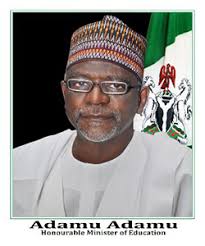A bill seeking the establishment of the National Examination Management Commission suffered set back on Monday as Minister of Education Adamu Adamu has kicked against it.
Stakeholders in education sector move against
Bill on examination commission
A bill seeking the establishment of the National Examination Management Commission suffered set back on Monday as Minister of Education Adamu Adamu has kicked against it.
The minister also rejected the Federal Unity Schools Establishment Bill suffered similar fate as the minister also rejected it saying that the two bills were not in the interest of education.
Adamu made the position known at a Public Hearing organised by Senate Committee on Education (Basic and Secondary) held in Abuja on Monday.
The bills are titled “National Examination Management Commission Bill, 2022 and Federal Unity Schools Establishment Bill, 2022 were Sen. Bima Enagi (APC-Niger) Sen. Kabiru Barkiya (APC- Katsina) respectively
The bill when passed into law would duplicate the functions of the Federal Ministry of Education, the minister who was represented by the Permanent Secretary in the Ministry, Mr David Gende said.
“The bill will undermine the role of the ministry in supervising the different types of examinations in the country by giving the role of supervising examination to the proposed commission.
“This will result into too many administrative bottlenecks that will result in reckless spending by the federal government,” he said.
On the federal unity schools bill, the minister said that unity schools were established with specific purposes and tampering with it would affect it negatively.
“Federal Unity Schools establishment Bill will expose schools to unnecessary lawsuits, leadership tussles and other vices that will be detrimental to the development of education.
“What the federal government should do is to establish more model schools that will meet the yearnings of Nigerians.”
The Registrar, Joint Admission and Matriculation Board (JAMB), Prof. Is-haq Oloyede in the same vein said that there was actually no problem with the current examination bodies in the country as they were all doing well.
According to him, the bill will only end up causing more confusion as it will create duplication of duties.
Also speaking, Head of National Office, WAEC, Nigeria, Mr Patrick Areghan said that the bill would give room for counter productivity as all examination bodies have governing boards.
In her remarks, Vice Chairperson of the Committee Sen. Akon Eyakenyi said that government’s at all levels “owe the nation the responsibility of ensuring that the education sector works.
“We need to give all the necessary support to the sector do that the future generation gets the best in education.”
She explained that the federal unity schools bill was not to set up a board but to give a legal framework to the schools.
The minister also rejected the Federal Unity Schools Establishment Bill suffered similar fate as the minister also rejected it saying that the two bills were not in the interest of education.
Adamu made the position known at a Public Hearing organised by Senate Committee on Education (Basic and Secondary) held in Abuja on Monday.
The bills are titled “National Examination Management Commission Bill, 2022 and Federal Unity Schools Establishment Bill, 2022 were Sen. Bima Enagi (APC-Niger) Sen. Kabiru Barkiya (APC- Katsina) respectively
The bill when passed into law would duplicate the functions of the Federal Ministry of Education, the minister who was represented by the Permanent Secretary in the Ministry, Mr David Gende said.
“The bill will undermine the role of the ministry in supervising the different types of examinations in the country by giving the role of supervising examination to the proposed commission.
“This will result into too many administrative bottlenecks that will result in reckless spending by the federal government,” he said.
On the federal unity schools bill, the minister said that unity schools were established with specific purposes and tampering with it would affect it negatively.
“Federal Unity Schools establishment Bill will expose schools to unnecessary lawsuits, leadership tussles and other vices that will be detrimental to the development of education.
“What the federal government should do is to establish more model schools that will meet the yearnings of Nigerians.”
The Registrar, Joint Admission and Matriculation Board (JAMB), Prof. Is-haq Oloyede in the same vein said that there was actually no problem with the current examination bodies in the country as they were all doing well.
According to him, the bill will only end up causing more confusion as it will create duplication of duties.
Also speaking, Head of National Office, WAEC, Nigeria, Mr Patrick Areghan said that the bill would give room for counter productivity as all examination bodies have governing boards.
In her remarks, Vice Chairperson of the Committee Sen. Akon Eyakenyi said that government’s at all levels “owe the nation the responsibility of ensuring that the education sector works.
“We need to give all the necessary support to the sector do that the future generation gets the best in education.”
She explained that the federal unity schools bill was not to set up a board but to give a legal framework to the schools.

